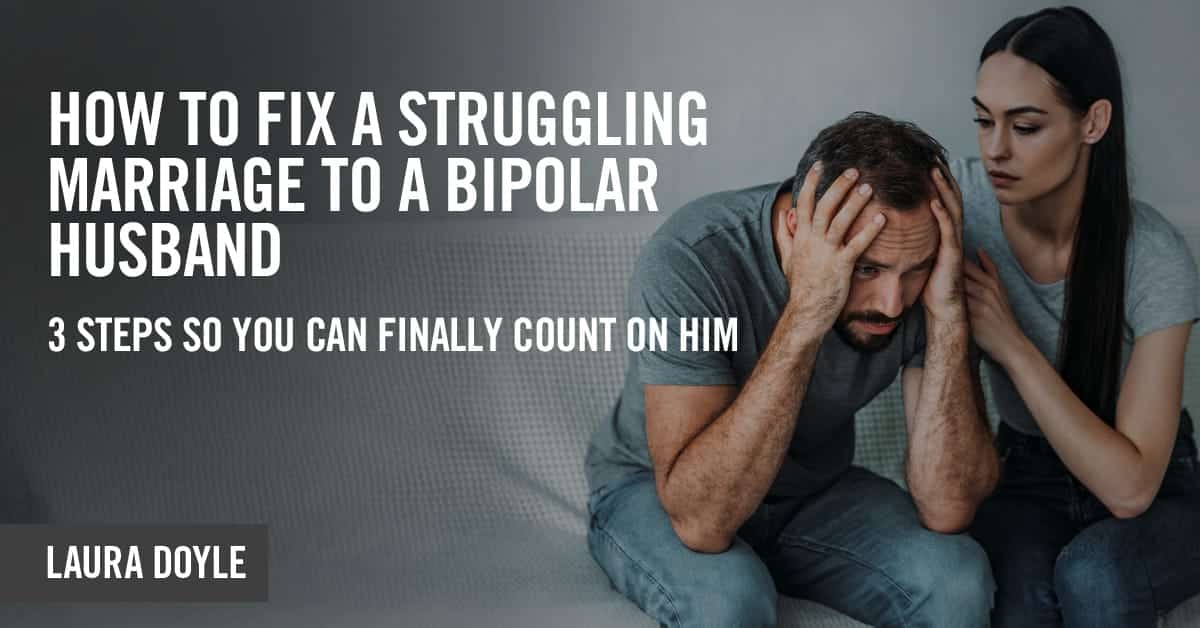How to Fix Marriage to a Bipolar Husband

It’s so dreary to find out you’re married to someone with bouts of exhaustion and depression interspersed with manic behavior.
It feels like a bait-and-switch. How are you ever going to have a great partnership when there are just those two extremes, nothing in the middle, and no normal husband behavior?
It’s scary because not only are you married to someone who can’t always be a good partner to you, it sucks up your time and energy trying to care for him. Instead of a playful, passionate marriage, you’re left with a stressful burden. Ugh!
But it doesn’t have to be that way. You too can be a ridiculously happy wife, even if your husband is bonafide bipolar.
Here are three ways you can turn this around:
Contents
1. Don’t Do What I Did

Of course, you want to be supportive and know how you can best help him with his challenges.
One big temptation is also a common recommendation from experts for wives of husbands with bipolar disorder and other diagnoses and neurodiverse conditions: to help him come up with a treatment plan, manage his medications, and watch out for signs that he’s falling into a depression or manic state.
This absolutely seems like the right thing to do because all the so-called experts say so.
But you won’t catch me saying that because, as a wife whose husband was diagnosed with a mental disorder, I did all that back when our therapist declared that John had ADD and I’ve gotta tell you, it was pretty disastrous.
My husband didn’t feel very respected that I was so focused on his deficit disorder all the time, for one thing. Can you imagine how that would feel if someone was always talking about your “deficit”?
It wasn’t very respectful. Since respect is like oxygen to him and most husbands, John probably felt like he was suffocating. Naturally, he was defensive. But I was determined to “help” him.
Or was I actually just criticizing him by saying he was not very capable or competent? That’s how he took it.
In retrospect, that’s exactly what I meant. In a nice way.
But there is no nice way to say “You can’t manage anything yourself, so let me tell you how to do it.”
Meanwhile, I was resentful that he wasn’t doing more to fix his ADD so he would be normal (whatever that is) so that I could finally be happy! I was also exhausting myself trying to control someone I couldn’t control. That crushed the intimacy and created distance, tension, and fighting.
Still, I thought it was all his fault. Him and his ADD.
What a mess.
You might argue that bipolar disorder is different. It’s not the same as ADD. It’s true I know only a little about your situation, and you’re the expert on your life.
But I know I’ll never go down the dark alley of trying to manage or control my husband thinking it will lead to a happier marriage if I could just fix him. That just backfires.
Fortunately, there’s a much, much, much better way to get a shiny marriage with a bipolar, ADD or otherwise neurodiverse husband…
2. Focus on His Good Qualities

What if there were no actual payoff to focusing on your husband’s bipolar moods but you could instead change some other things that would lead to your marriage feeling easier and happier?
What if you could change some things that are within your control and then he showed up differently?
Now you’re looking at things through the lens of my experience, and the experience of thousands of clients. But we could only see it in retrospect—after we’d practiced The 6 Intimacy Skills™ and started respecting and trusting our husbands and replenishing ourselves.
Being on the other side of that challenge, it seems obvious that focusing on a diagnosis like bipolar was no help at all. Today, by focusing on other things, my husband’s ADD no longer hurts me or our marriage. I never think about it anymore because it just…went away.
You might be thinking, but HOW is your situation ever going to improve if you don’t improve him?
One way is to use your influence wisely.
Instead of focusing on what’s wrong with him, catch him doing something good.
Instead of being hyper-vigilant for signs of depression, insomnia, or mania that would confirm he’s bipolar, how about focusing on how he took the trash out, played with the kids, or walked the dog?
Since what you focus on increases, you will naturally start to have a very different experience with your husband if you make a gratitude list instead of a list of all the symptoms he’s showing.
That leads us to Step 3.
3. Act as if He Is Just a Regular Guy

For me, the answer to my suffering was to pretend my husband was normal. And now, it really seems like he is—not just normal but pretty awesome in the husband department. Now I can see how funny John is, how calm and sweet, playful and supportive and smart.
It’s not hard to be happy with someone who makes me laugh so much, makes my tea every morning, and makes up songs about how cute I am.
So it’s interesting to think about what your experience might be if you celebrated your husband’s good qualities instead of his annoying ones, which everybody has.
There is no perfect husband, as far as I know, but your bipolar husband could just be perfect for you.
Now that you know the three ways to inspire your man to be his best self, which will you experiment with? I’d love to hear in the comments.


One reply on “How to Fix Marriage to a Bipolar Husband”
I hope Laura Doyle’s book, and work book help me, to be an adored wife, and save my marriage.